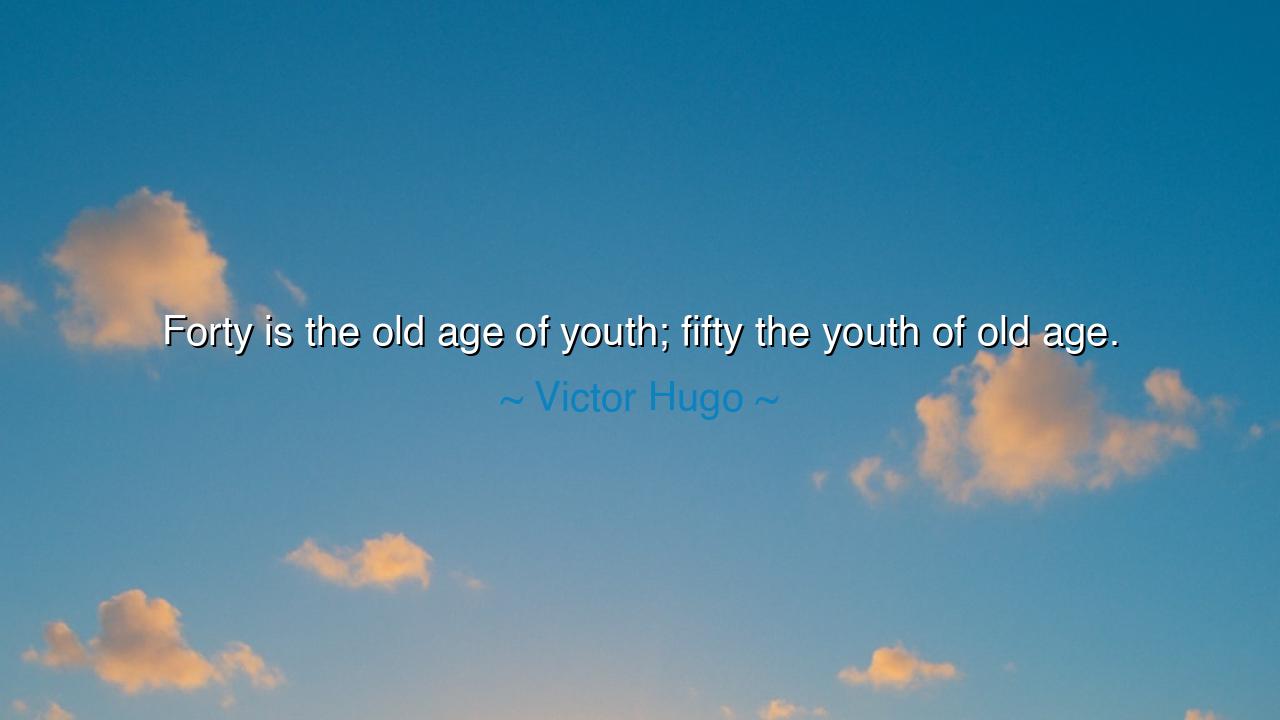
Forty is the old age of youth; fifty the youth of old age.






"Forty is the old age of youth; fifty the youth of old age." – Victor Hugo
In these words, Victor Hugo offers a profound reflection on the fluid nature of age and the ever-changing perception of time. He reveals that the passage from youth to adulthood is not a rigid division, but a spectrum, and that the true meaning of age lies not in the number of years we live, but in the way we embrace each stage of life. At forty, the vigor of youth has begun to fade, and yet, one often finds oneself still bound by the aspirations and struggles of youth. This is the moment when we realize that the dreams of youth are slipping away, and with them, so too does our sense of invincibility. Forty, then, can feel like the twilight of our youthful strength.
However, Hugo’s second assertion is equally vital: fifty is the age where youth may yet be rediscovered. By fifty, one’s body may feel the weight of years, but one’s spirit, if nourished by wisdom and experience, may be as vibrant and hopeful as in the days of youth. Hugo suggests that true youth is not merely about physical energy but about the spirit, the mind, and the courage to redefine oneself, regardless of age. Youth is not a matter of the body’s vitality, but of the heart’s desire to remain fresh, curious, and open to the possibilities of the future.
Consider the example of Leonardo da Vinci, who, despite his advanced age, continued to invent, create, and dream. In his later years, his body grew weak, but his mind and heart remained young. At fifty, he was not slowing down; rather, he was delving deeper into his exploration of anatomy, engineering, and art. It is said that, even as he neared death, his curiosity was as fresh as it had ever been. Da Vinci’s life serves as a testament to Hugo’s insight: the true essence of youth lies in the mind and in the will to continue learning and creating, regardless of physical decline.
Similarly, the life of Nelson Mandela offers an inspiring reflection on this idea. When he was released from prison at the age of seventy-one, many might have assumed that his best years were behind him. Yet, in his seventies and even into his eighties, Mandela redefined leadership, transforming South Africa and guiding the nation through its most profound challenges. His spirit remained youthful because he never ceased to dream or to hope for a better world, and his actions were driven by the belief that no matter how old the body, the heart could remain strong and purposeful.
Hugo’s quote challenges the conventional narrative of aging—that youth is a brief, fleeting moment, and old age is an inevitable decline. Instead, he presents a life where each stage has its own potential for growth and renewal. Forty is not the end of vitality, nor is fifty the beginning of decay. In fact, Hugo suggests that each age has a unique role to play in the journey of life. Forty may feel like the end of youth, but fifty, with its accumulated wisdom, is the time to reclaim the freedom and joy of youth in a more profound and reflective way.
The lesson to take away from this reflection is clear: we must embrace every stage of life, recognizing that youth is not defined by age but by our capacity to continue growing, learning, and dreaming. We must shatter the notion that our best years are behind us and instead find ways to remain curious, vibrant, and hopeful. No matter our age, we must ask ourselves, “What new dreams can I pursue? What new adventures can I undertake?”
The practical action here is simple but essential: never cease to learn, explore, and create. Whether you are forty, fifty, or sixty, do not let your spirit grow stagnant. Find a new challenge to overcome, a new hobby to explore, or a new way to serve others. Keep your mind open, your heart full of hope, and your hands willing to build a future that is vibrant with the promise of possibility. For the greatest thing in life is not how old we are, but how young we keep our minds and spirits, no matter the years that pass.






AAdministratorAdministrator
Welcome, honored guests. Please leave a comment, we will respond soon